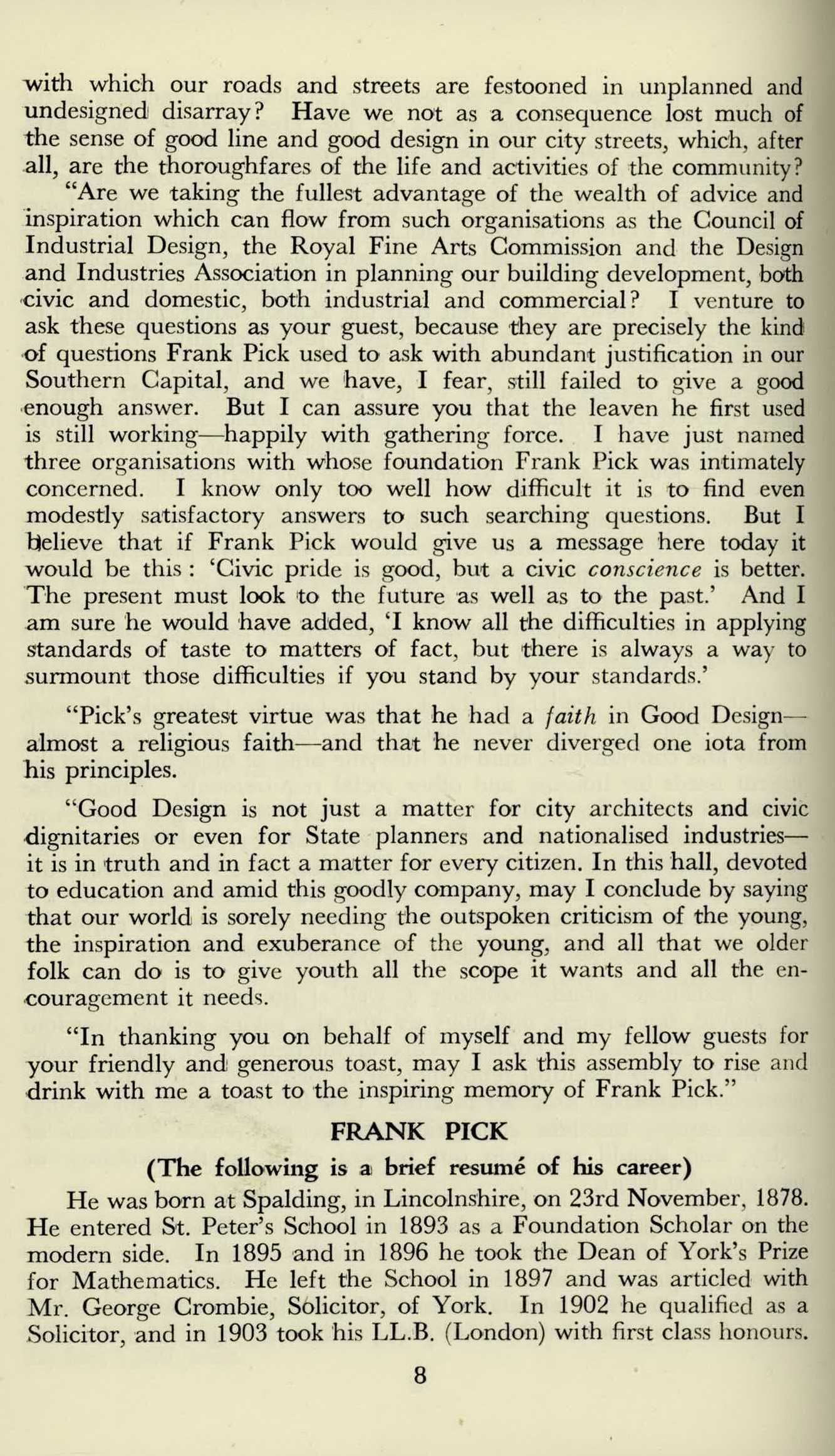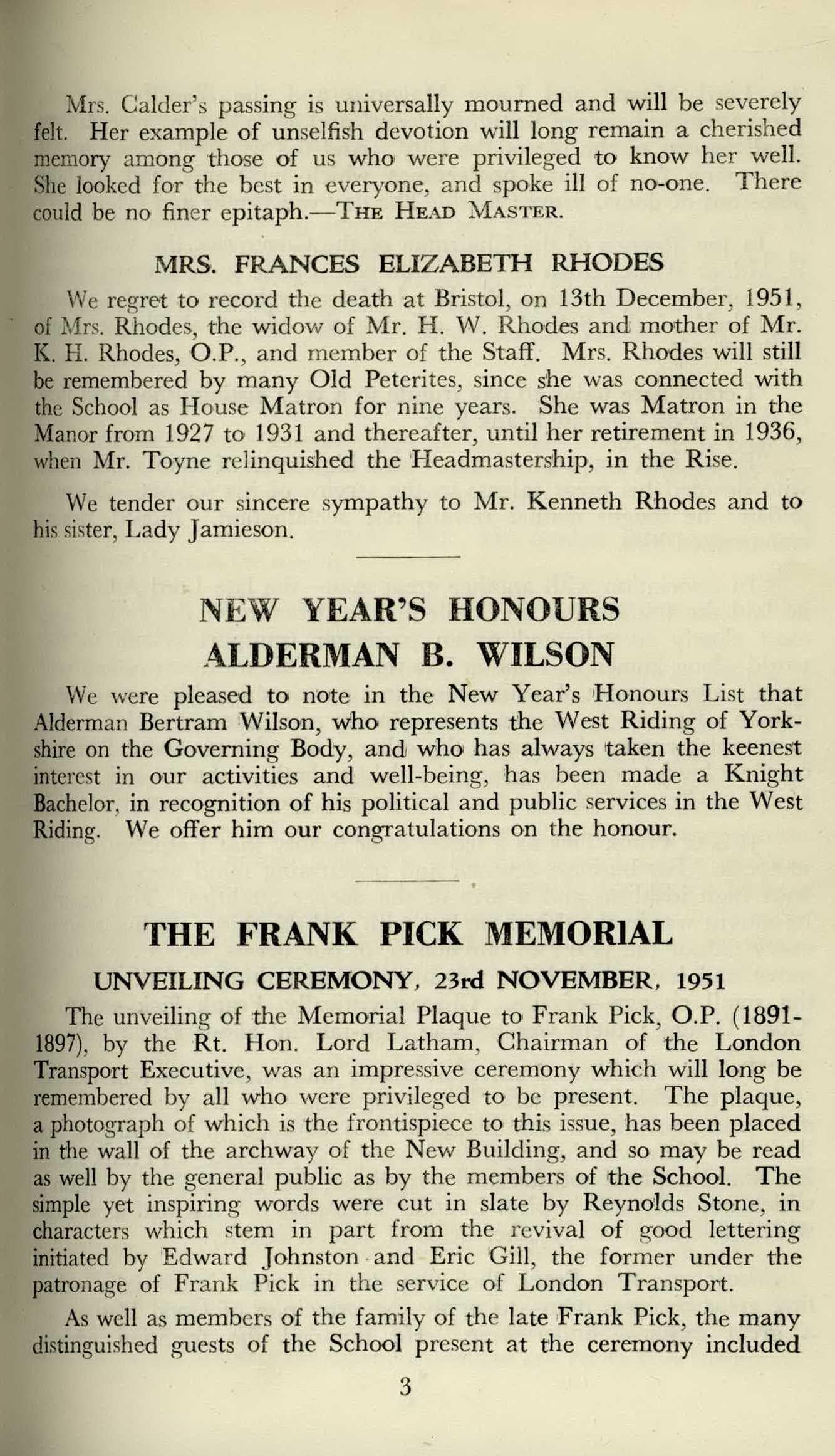
14 minute read
The Frank Pick Memorial
from Jan 1952
by StPetersYork
Mrs. Calder's passing is universally mourned and will be severely felt. Her example of unselfish devotion will long remain a cherished memory among those of us who were privileged to know her well. She looked for the best in everyone, and spoke ill of no-one. There could be no finer epitaph.—THE HEAD MASTER.
MRS. FRANCES ELIZABETH RHODES
We regret to record the death at Bristol, on 13th December, 1951, of Mrs. Rhodes, the widow of Mr. H. W. Rhodes and mother of Mr. K. H. Rhodes, O.P., and member of the Staff. Mrs. Rhodes will still be remembered by many Old Peterites, since she was connected with the School as House Matron for nine years. She was Matron in the Manor from 1927 to 1931 and thereafter, until her retirement in 1936, when Mr. Toyne relinquished the Headmastership, in the Rise.
We tender our sincere sympathy to Mr. Kenneth Rhodes and to his sister, Lady Jamieson.
NEW YEAR'S HONOURS ALDERMAN B. WILSON
We were pleased to note in the New Year's 'Honours List that Alderman Bertram Wilson, Who represents the West Riding of Yorkshire on the Governing Body, and who has always taken the keenest interest in our activities and well-being, has been made a Knight Bachelor, in recognition of his political and public services in the West Riding. We offer him our congratulations on the honour.
THE FRANK PICK MEMORIAL
IP UNVEILING CEREMONY, 23rd NOVEMBER, 1951
The unveiling of the Memorial Plaque to Frank Pick, O.P. (18911897), by the Rt. Hon. Lord Latham, Chairman of the London
Transport Executive, was an impressive ceremony which will long be remembered by all who were privileged to be present. The plaque, a photograph of which is the frontispiece to this issue, has been placed in the wall of the archway of the New Building, and so may be read as well by the general public as by the members of the School. The simple yet inspiring words were cut in slate by Reynolds Stone, in characters which stem in part from the revival of good lettering initiated by 'Edward Johnston and Eric Gill, the former under the patronage of Frank Pick in the service of London Transport. As well as members of the family of the late Frank Pick, the many distinguished guests of the School present at the ceremony included 3
the Lord Mayor and Lady Mayoress and the Sheriff of York, administrative heads of British Railways, and prominent representatives of all aspects of the life of the City. And the weather, which might have gone far to mar proceedings which inevitably had to take place out of doors, proved kind. The day was bright and clear.
In the absence of the Chairman of the Governors, the Very Rev. E. Milner White, Dean of York, who was unable to be present owing to a sudden indisposition, the Head Master welcomed Lord Latham on behalf of the School. In offering the Memorial Plaque Lord Latham said : "I come here today to pay tribute to a very distinguished Old Boy of this School—the late Frank Pick. 1111
"Frank Pick was a great man with a high sense of social obligation, who devoted his great talents to the service of his fellows. He was selfless : he sought neither reward nor acclamation. Indeed, praise embarrassed him. "In association with another great man—the late Lord Ashfieldhe laid the foundations and built up the structure of the largest and most closely co-ordinated urban passenger transport system in the world—long known as London Transport. This transport system will remain a monument of achievement to a partnership which was indeed unique. For, surely, no two such different men ever found themselves so complementary the one to the other. All who go about London on their lawful occasions are under debt to both of them—and to one of them—Frank Pick—we are here to pay special honour. "It is of Frank Pick as a seeker after beauty that I especially wish to speak. His business acumen and penetrating mind were matched with 'high idealism and a 'love of the deeper qualities. The beauty he sought was in the things we live with and the things we live among every day of the year : in our homes, in our streets, wherever people move and have their being : beauty in small things—shall I say in the small change—of life. Characteristically, Frank Pick called it `Good Design' : there was nothing high-falutin' about Frank Pick. "To seek this kind of universal beauty was perhaps not remarkable —as an exercise indagsthetics it was engaging—but what was remark- able and exceptioN4 was his faith and courage in applying it to business. Here walqhe greatness—moral and personal—of Frank Pick. He blazed the trail and founded a tradition, the 'Frank Pick tradition', which not only still inspires London Transport but has had a worldwide influence in many other fields of human activity. "So it was that Frank Pick was the first great industrialist—the first great business man—to apply the principles of Good Design to a great business undertaking. He founded the tradition which 4
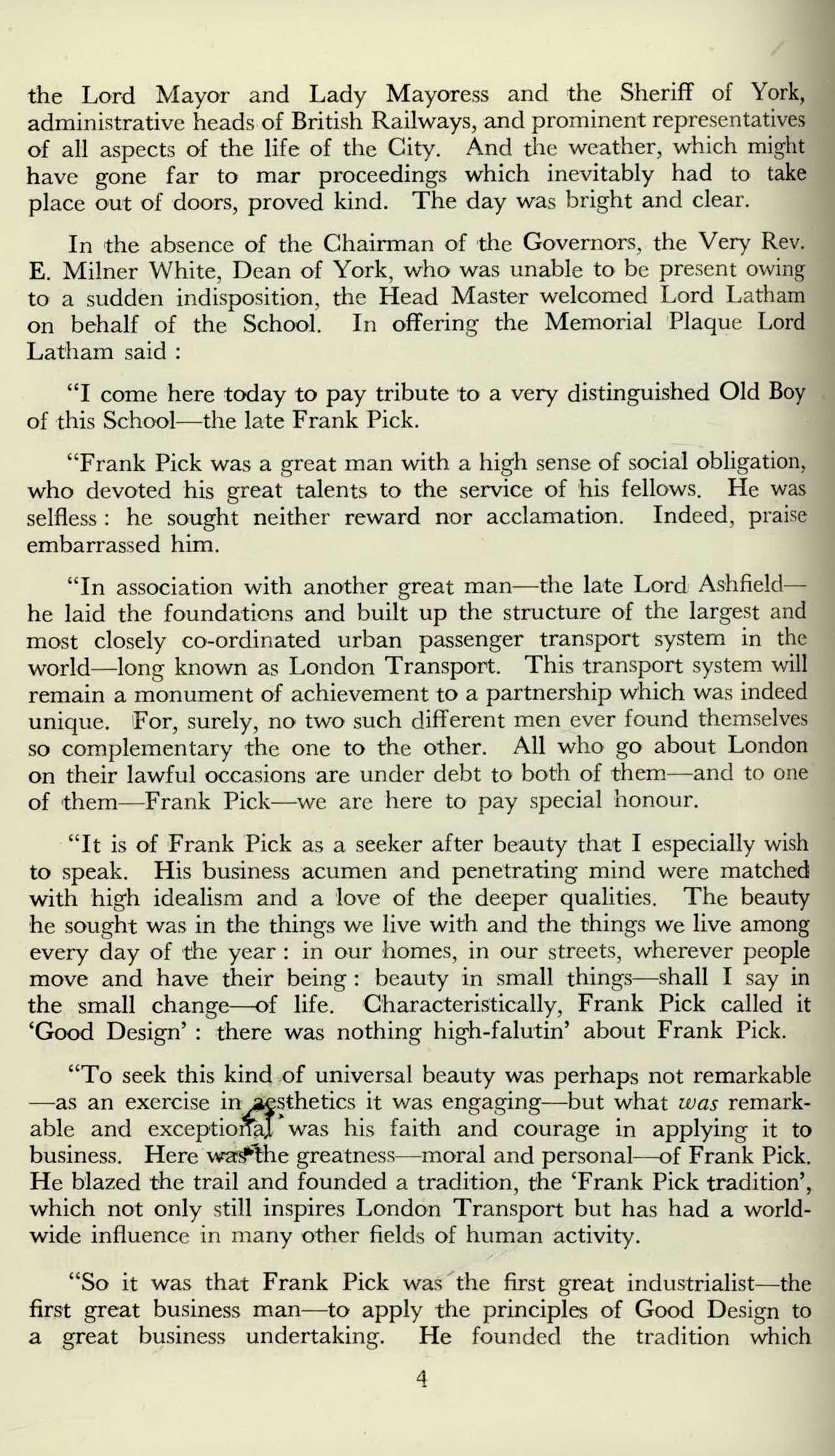
maintains that functional quality in manufacture or in service is not enough, and that every manufacturer and every public servant (and, indeed, every citizen) should—as an ethical duty, as good business, and as good citizenship—consider also the appearance of their products, the decency of all advertising and propaganda, and above all the needs of what we now call 'public amenity'. In the service of passenger transport in London, Frank Pick demonstrated his ideals. in practice, and he has left behind him patterns to stimulate us and ideals to guide us all. That is why London Tiansport .signs this Memorial Plaque. "But how did Frank Pick become a great man? ' "Was he a great scholar when he was here? No. It is true he took prizes in Maths., but he was unsuccessful in an attempt to win a scholarship to Oxford. He was an average scholar. "Was he brilliant at games? No. his House Colours for rowing. "Was he a social success? No. `hail fellow well met' to everyone and a His modest achievement was He was rather too shy to be nyone. "But knowing Frank Pick as I did, in his later years of fame and achievement, I am sure that 'he looked back on his days at this famous and ancient School as the basic preparation for his life-work. This School gave him all the quieter virtues—his modesty, his love of good music, and his passion for accuracy. It bred in him a determination, a perseverance and a zeal for hard work which, believe me, were astounding. I fancy I am right in suggesting that the close relation ship which your School maintains with this beautiful City of York and its superb Minster were largely responsible for Pick's lifelong enthusiasm for craftsmanship and good design in all things, but I know I am right in saying that Pick's character—and believe me he was a man of sterling character—was made and nurtured by St. Peter's. "You have every right to be proud of your School—as Frank Pick was—and in offering to you a Memorial Plaque in memory of one of your distinguished Old Boys I do so in the hope that all of you may be inspired by Frank Pick's life. His youth was not exceptional— but it was sound. His early manhood was hardworking and entirely self-reliant—he owed nothing to privilege or wealth. His work for transport in London was his life-work, and to it he gave all his talents and all his enthusiasm. If his tombstone were in London and needed an epitaph it might well be the epitaph on the tomb of another great contributor to London's greatness—Sir Christopher Wren—`If you wish for a memorial, look around you.' London's buses and coaches, London's tube trains and stations, London's bus stops and shelters, and all that living tradition of good design combined with efficiency and function which inspires his successors—these are Pick's true memorial.
5
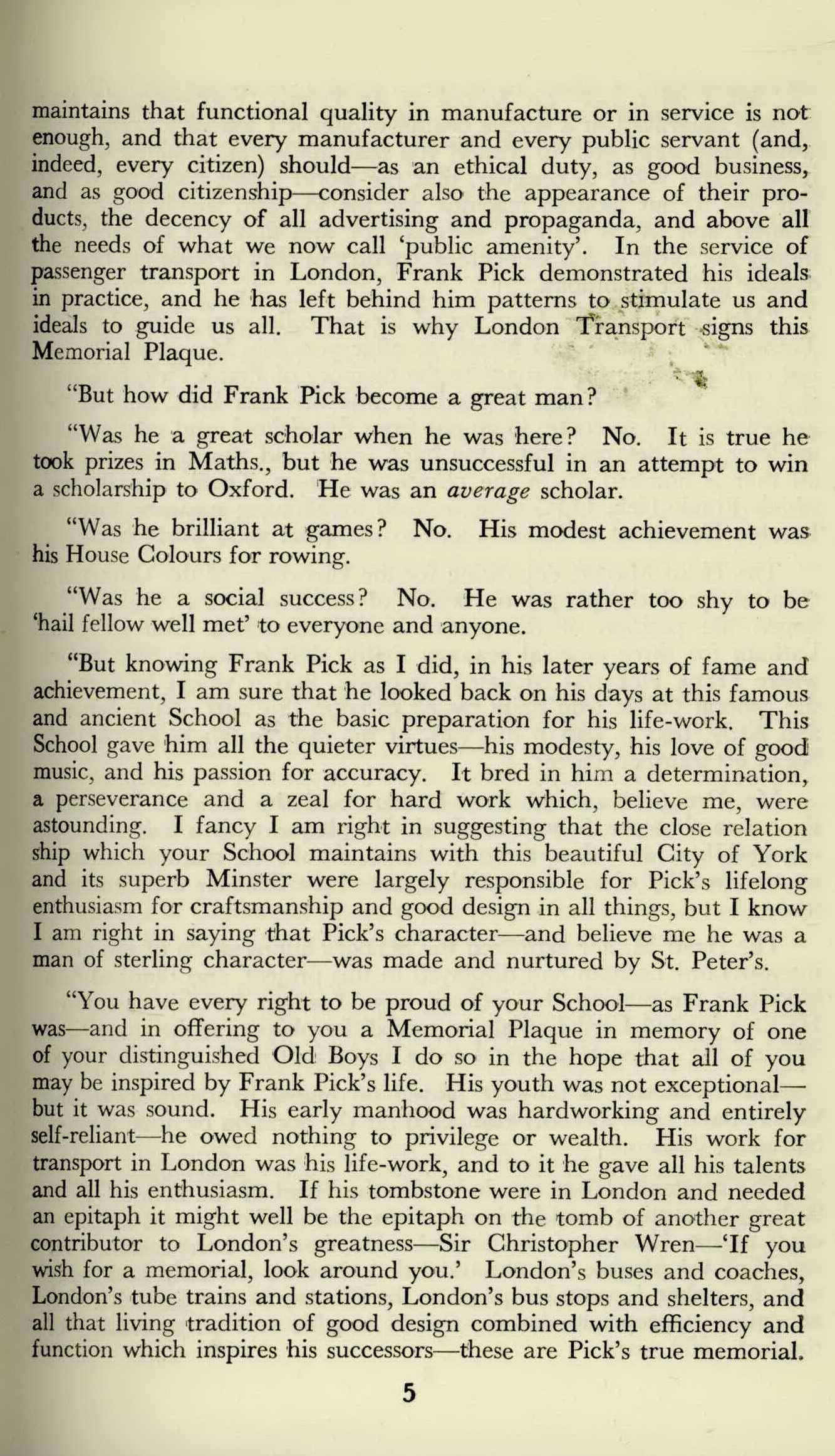
"But I offer you—his School of St. Peter's, York—a plain slab of slate (engraved in a simple beauty of which I am sure Frank Pick would have approved) to remind you that the world, troubled though it be, is still yours to conquer, that the world sorely needs men who can give to our modern machine age the idealism which built your Minster and which founded your School, and that you need neither money nor birth in this democratic country of ours to scale the heights of your proper ambitions. "Mr. Head Master, I am proud for my colleagues of the London Transport Executive and myself to offer you this Memorial Plaque, not only in respectful homage to the memory of Frank Pick, but also, if I may, as a challenge to the boys who are now here, and to the generations still to come, to go out from this School, and emulate the modesty, the determination, the hard work, and the enthusiasm for all that is summed up in the phrase 'Goodness, Truth, and Beauty' which Frank Pick, 0.P., gave in such overflowing measure through London Transport to London and to the great wide world beyond."
The Head Master, deputising for the Chairman of the Governors, then accepted the plaque on behalf of the Governors. He said he hoped the position of the plaque would commend itself to Lord Latham for three especial reasons; firstly, that it was in the School where Frank Pick was educated; secondly, that it would be seen by the general public who daily passed through this part of the School; and lastly, that it was in full view of the railway where Frank Pick began his transport career.
Mr. Dronfield assured Lord Latham and the London Transport Executive that the School received this plaque with a full sense of responsibility, and that the site chosen would be maintained in a manner worthy of this memorial to one of the School's most eminent sons.
The Head Master expressed the School's appreciation of the great interest Lord Latham had displayed in •this project, and thanked him especially for making the journey from London for this ceremony. He then invited Lord Latham to unveil the plaque, at the same time inviting the audience to stand for a space in tribute to Frank Pick.
There followed a fan-fare played on bugles by members of the C.C.F. Band, and specially composed for the occasion by J. A. Sutton, one of the buglers.
The ceremonial was concluded by the Head of the School (J. T. Ankers) presenting Lord Latham with a specially bound and inscribed copy of the History of the School. He thanked Lord Latham for unveiling the plaque, and remarked that since his Lordship had today added another memorable page to the History of the School it was altogether appropriate that he should be able to read something of the first 1,300 years.
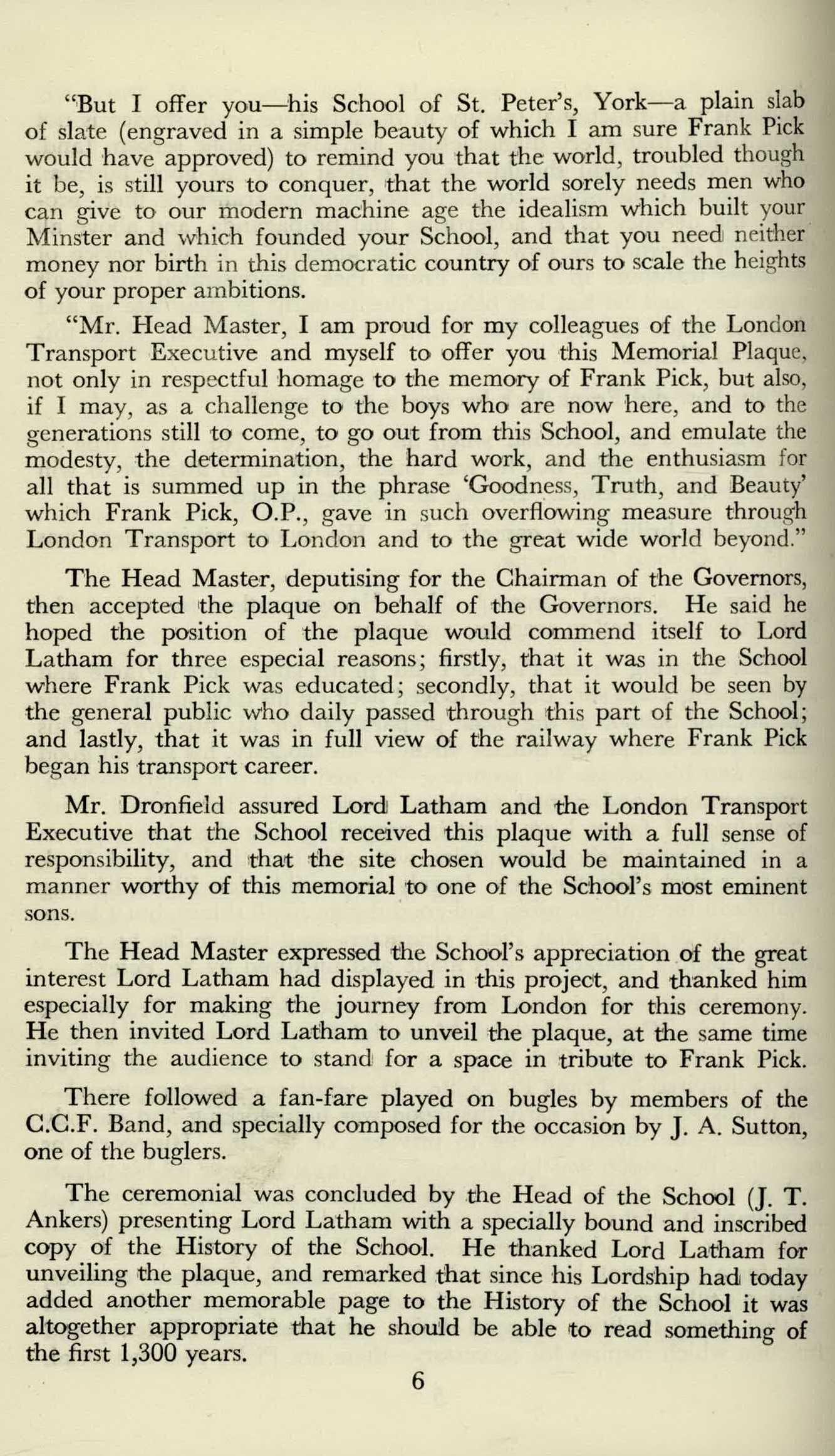
After the ceremony a large company sat down to luncheon in the School Dining-hall as the guests of the Head Master and Mrs. Dronfield. The toast of "The Visitors" was proposed by Mr. C. M. Jenkin-Jones, a Governor of the School and former General Manager of the North Eastern Region of the L.N.E.R. Mr. Jenkin-Jones recalled that Frank Pick had begun his transport career in the service of the L.N.E.R., which had sprung from the first railway company in the world. York, too, could boast in St. Peter's the oldest Public School in the world, and he felt that the School motto might well be considered most suitable for the railways. Justifying any extravagance of pronunciation by the dictum of Mr. Churchill that a man may pronounce a foreign language in any way he chooses. Mr. JenkinJones quoted the original Latin, "ingredere ut proficias super antiquas vias", and gave a translation cleverly adapted to his point : "Go on with your journey so long as you keep on the permanent way".
In his reply, Lord Latham dwelt on the inspiring lead which Frank Pick had given to all who were concerned with town-planning today. In York we had the especially difficult problems of marrying an ancient walled city, with its Castle, its Bars, and its magnificent Minster, to the great industries and the important railway centre which our modern age has added to it.
"As a former leader of the London County Council," he said, "I know only too well how difficult it is to plan development with beauty and convenience, amid the hurrying press of modern life and the urgent needs for housing and other social requirements. Amid these pressures there is a real danger that often, unwittingly, tomorrow will be sacrificed for today. It is, I feel, only by faith and courage in the enduring values of beauty and dignity that we can avoid the errors of the past and the reproaches of the future, and create the conditions of communal life in which people can know and enjoy the arts and ways of dignified, happy, and comfortable living. OF "I sometimes wonder whether as well as preserving, as, of course, we should, our ancient buildings we are also giving enough freedom and encouragement to contemporary architecture. We cannot make a living City by beautiful reproduction of medimval half-timbering or
Georgian classicism, however faithful. Our buildings and our settings should express the best conceptions, ideas, and visual emotions of today, and should represent our present ethos, as the buildings of past ages did theirs. "Are we quite sure that what we nowadays call 'street furniture' is not merely 'street clutter' and is neither as carefully designed nor as appropriately placed as it should be? Do we sufficiently appreciate how the beauty and attractiveness of fine buildings can be overlaid and hidden by the multitude of posts, standards, signs, and the like,
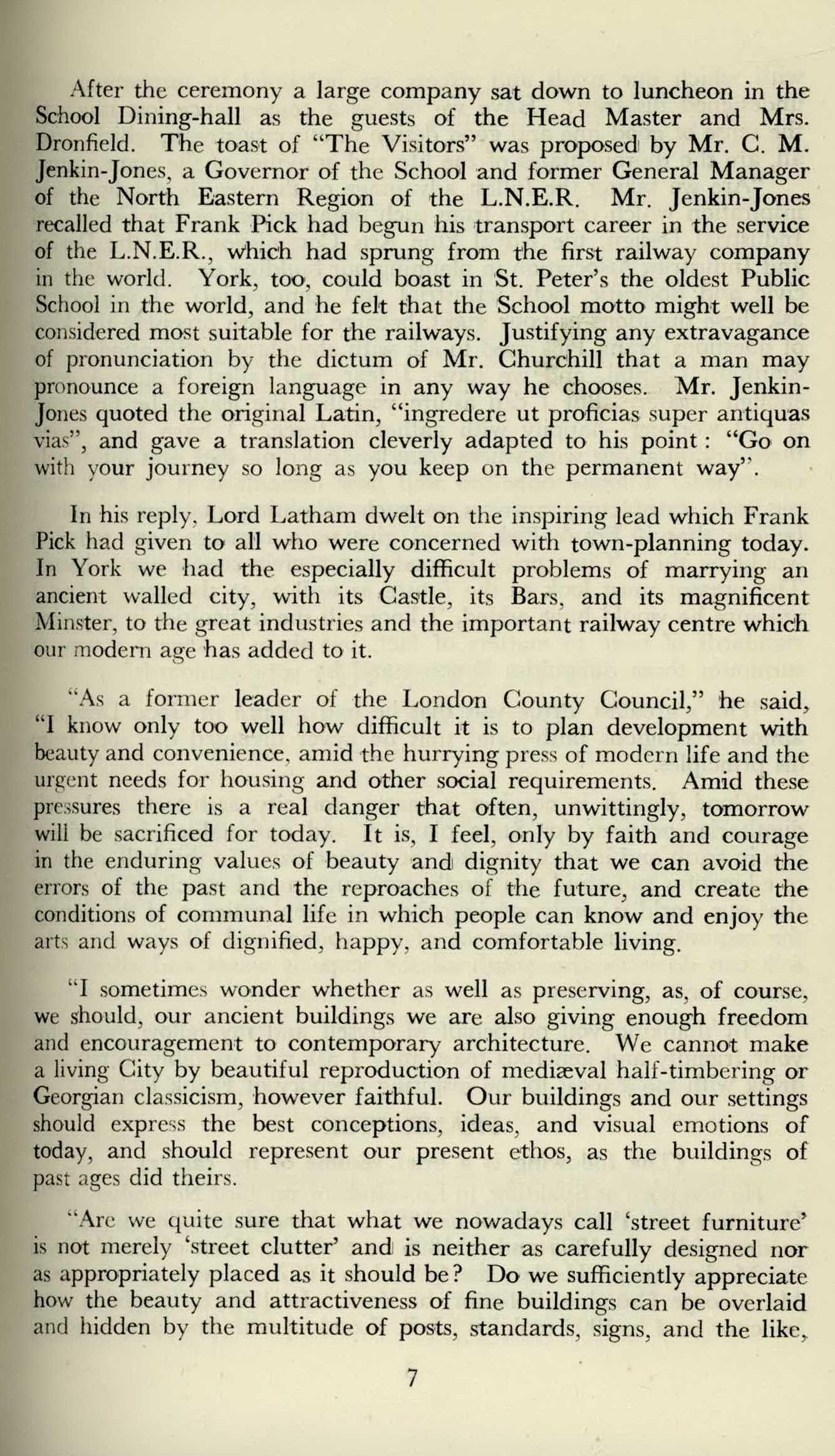
with which our roads and streets are festooned in unplanned and undesigned disarray? Have we not as a consequence lost much of the sense of good line and good design in our city streets, which, after all, are the thoroughfares of the life and activities of the community? "Are we taking the fullest advantage of the wealth of advice and inspiration which can flow from such organisations as the Council of Industrial Design, the Royal Fine Arts Commission and the Design and Industries Association in planning our building development, both civic and domestic, both industrial and commercial? I venture to ask these questions as your guest, because they are precisely the kind of questions Frank Pick used to ask with abundant justification in our Southern Capital, and we have, I fear, still failed to give a good enough answer. But I can assure you that the leaven he first used is still working—happily with gathering force. I have just named three organisations with whose foundation Frank Pick was intimately concerned. I know only too well how difficult it is to find even modestly satisfactory answers to such searching questions. But I believe that if Frank Pick would give us a message here today it would be this : 'Civic pride is good, but a civic conscience is better. The present must look to the future •as well as to the past.' And I am sure he would have added, 'I know all the difficulties in applying standards of taste to matters of fact, but there is always a way to surmount those difficulties if you stand by your standards.' "Pick's greatest virtue was that he had a faith in Good Design— almost a religious faith—and that he never diverged one iota from his principles. "Good Design is not just a matter for city architects and civic dignitaries or even for State planners and nationalised industries— it is in truth and in fact a matter for every citizen. In this hall, devoted to education and amid this goodly company, may I conclude by saying that our world is sorely needing the outspoken criticism of the young, the inspiration and exuberance of the young, and all that we older folk can do is to give youth all the scope it wants and all the encouragement it needs. "In thanking you on behalf of myself and my fellow guests for your friendly and generous toast, may I ask this assembly to rise and drink with me a toast to the inspiring memory of Frank Pick."
FRANK PICK (The following is a brief resume of his career)
He was born at Spalding, in Lincolnshire, on 23rd November, 1878. He entered St. Peter's School in 1893 as a Foundation Scholar on the modern side. In 1895 and in 1896 he took the Dean of York's Prize for Mathematics. He left the School in 1897 and was articled with Mr. George Crombie, Solicitor, of York. In 1902 he qualified as a Solicitor, and in 1903 took his LL.B. (London) with first class honours.
8
